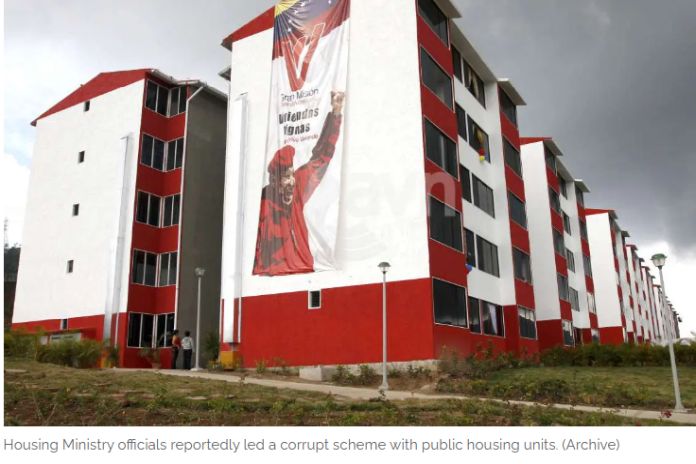- Legislator and activist Rigel Sergent also highlighted growing eviction efforts affecting hundreds of families.
By Ricardo Vaz
CARACAS, (venezuelanalysis.com) – The Venezuelan National Assembly (AN) has condemned a reported corruption scheme involving the government’s Great Housing Mission (GMVV). On Wednesday, the parliament’s Housing and Urban Development Subcommission expressed its rejection of the reported illegal apartment dealings and support for the ongoing investigation.
On October 17, the Venezuelan attorney-general’s office charged ten housing ministry officials who allegedly extorted payments from families living in apartments belonging to the Housing Mission or forced evictions in order to assign them to new residents.
Security forces executed the arrests in the Coche and Las Mercedes neighborhoods of Caracas. According to reports, the ministry workers, who held positions as directors or analysts, took advantage of their access to databases to change the official housing registries.
National Assembly deputy and activist Rigel Sergent told Venezuelanalysis that the criminal proceedings stem from longstanding cases of GMVV homes being sold by people who either have left the country or have not occupied the assigned units.
“This is a case of commodifying housing, and it’s really important to address this problem, even if it is something that has happened very rarely,” he said.
Sergent, who heads the legislative Housing and Urban Development Subcommission, added that a new vice ministry dedicated to the Housing Mission deepened ongoing investigations to unveil that ministry workers were engaged in irregular processes to replace the original housing awardees.
Venezuela’s Great Housing Mission was created in 2011 by former president Hugo Chávez to generate dignified homes for working-class families, especially in urban centers. According to official figures, the social program has provided five million homes thus far. The families adjudicated houses or apartments sign lifetime leases at small to no costs, but they do not get property titles.
In addition to the corruption investigation, Sergent likewise expressed concern over a growing spate of threats and evictions against tenants.
“There is a pattern where tenants and legal occupants are criminalized as ‘invaders’ in order to force them to leave their homes,” he explained. “Over the past year we’ve received some 200 complaints, affecting 600 families, and new cases arrive every day.”
Sergent, a longtime activist of the Tenants Movement, stressed that while in the past the eviction efforts were mostly isolated, now there are several cases affecting entire buildings. The deputy highlighted common irregularities including people claiming to own or to have inherited apartment blocks without providing any legal backing.
On October 8, hundreds of activists took to the streets to celebrate World Habitat Day, commemorate the housing advances under the Bolivarian Revolution and draw attention to the growing number of eviction cases.
The mobilization included a popular assembly and outreach initiatives with the interior ministry and the attorney-general’s office. Sergent stated that the two institutions’ reactions were very different, with the Interior Ministry immediately setting up a workgroup to review the eviction cases brought up by the grassroots movements.
In contrast, the attorney-general’s office has not taken any initiative to address the concerns of popular movements. Organizers have denounced that public prosecutors often ignore Venezuelan legislation to execute evictions through the court system. A spokesperson from Aragua state chosen in the October 8 assembly has since faced a criminal process and eviction attempt.
Sergent emphasized that the struggle against housing being commodified and subjected to a speculative market requires an effort to develop new property models. He added that the Venezuelan legislation includes different collective property schemes. One such case is a group of families jointly owning an urban building. Housing authorities have successfully led tenant associations to purchase blocks of long-rented apartments in favourable conditions under this concept.
Finally, Sergent affirmed that a revolutionary policy to secure housing as a social right should go beyond building new houses and apartment blocks.
“It is certainly important, providing homes for families in need. But there are other priorities such as the improvement of the habitat and the development policies for houses that already exist,” he said. “In cases of families that have rented for decades, we need to secure their tenancy and provide avenues for them to acquire their homes, preferably under collective ownership.”





